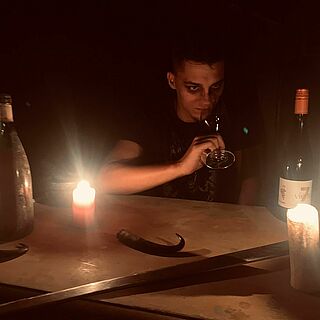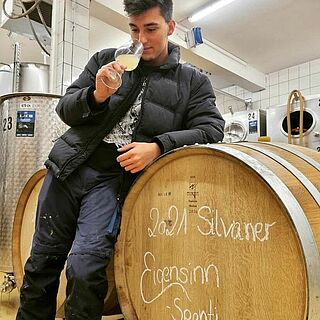Wine Campus alumnus Michael Meusert honored as Young Winemaker of the Year 2025
Congratulations on being named DLG Young Winemaker of the Year 2025! What does this award mean to you?
Thank you for the congratulations! As a young business successor, I'm not always sure whether the decisions I make are the right ones. Getting official confirmation that you're on the right path gives me a lot of self-confidence.
Of course, the award needs to be used. That means a lot of communication work. I'm only just beginning to understand what the award means for the company. We are perceived very differently and some doors open much more easily than they did before. I'm very excited about what lies ahead for me.
What was the application process like?
The application process has three stages: first you register for the online test - 20 minutes to answer lots of questions. This is very similar to an exam at the Wine Campus. The best 15 applicants are then allowed to send in three wines, which are evaluated according to the DLG tasting scheme. The ten best applicants are then invited to present themselves to the jury. This final round consists of three parts: first you introduce yourself and your own business. In my case, it was probably decisive that, in addition to the positive development of the business, I also revived the local winegrowers' association and organized numerous events together with many helpers from our home town.
This is followed by a blind tasting, where you can show what you have learned from Ulrich Fischer's lectures on sensory analysis and wine appreciation. Finally, the jury will ask you a few questions.
You graduated from the Wine Campus in 2022. When you look back now, what content helps you most in your professional practice?
To be honest, there's very little that doesn't help. And some things that, in hindsight, I wish I had paid a little more attention to. The topics that I was particularly interested in were also my main focus at work: oenology , communication and sales. These subjects help me enormously today. In the future, controlling tasks and new concepts for wine tourism will also play a greater role. I benefit greatly from the broad foundation that my studies have laid.
Working on a 50-hectare irrigation system in your home town is certainly a major project. How is the irrigation requirement of the vine measured and was this done during your studies?
If you're not a morning person, you can measure the early morning water potential with the Scholander bomb. Put simply, you measure how much water the vine has to suck out of the soil. Above a certain threshold value measured in megapascals, you should irrigate appropriately depending on the quantity and quality requirements.
A few fellow students with low sleep requirements did a practical project on the subject. This was then presented towards the end of the semester. That was always a great opportunity to learn from the experiences of my fellow students.
How can your bachelor's thesis "Comparison of ion exchangers and tartaric acid for pH reduction in Chardonnay and Gewürztraminer must" be summarized in a few sentences? How did the topic come about?
The topic was a suggestion from Patrick Nikolaus. As I have always been interested in how to work with as few additives as possible in wine, I was happy to accept the topic. It was a happy coincidence that my internship company in South Tyrol was in the process of deciding whether the borrowed ion exchanger would be useful. It was a perfect fit.
The bottom line of my work is that treatment with the ion exchanger (IAT) makes sense if the must or wine has a high pH value and high acidity levels at the same time. Conventional acidification would make the wine too acidic in this case, whereas lowering the pH value with the IAT significantly reduces the acidic taste, but stabilizes the wine microbiologically.
You are now the managing director of your own family winery (Weingut Meusert in Fahr am Main). Did you always plan to take over the business one day? How do you go through your studies when you have this prospect in mind from the outset?
I actually wanted to do everything until I was 17 or 18. Just not a winemaker. That was because I didn't really understand what my father was doing in the vineyard and cellar and, above all, why . Then, on a whim, I visited the Wine Campus open day and was very impressed. The combination of natural sciences and the family-oriented structure of the course convinced me. My questions about the "why" were answered very well.
When I made my first wine, I quickly became fascinated with wine as a material.
My path through my studies was always characterized by taking over a business. I focused heavily on the topics where I saw the greatest need in our business. That often helped me to get through less popular modules. However, this also left me with a few gaps in my knowledge, which I am now able to fill myself. So I can only advise everyone to pay close attention in all modules. It all makes sense. Even if I sound a bit old now (la cht).
At the winery, you work with Piwis, produce non-alcoholic wines and are constantly developing your range. As managing director, how do you decide which old traditions should be upheld and when new entrepreneurial paths make sense?
The core of our business has always been a very close and sometimes friendly relationship with our customers, apart from a decent quality of wine. For me, this principle is the only thing that should never be changed. We even focused on this as part of our rebranding "Zu Gast bei Freunden" has been our official company motto since 2024.
For all other topics, I ask myself questions: how are society and politics developing, what is the economy doing? So what are the things that I cannot significantly influence? For example, as winegrowers we won't be able to stop the trend towards a lifestyle with less alcohol consumption. That's why I want to gain experience with non-alcoholic wines early on so that I don't have to make up for it in 10 years' time, when the processes allow for even better end products.
Then, of course, personal preferences play a big role: I really enjoy interacting with our guests, organizing events and wine tours. I also really enjoy working in the cellar and experimenting with vinification, so the wine quality and our range are constantly evolving. To put it briefly: If something makes sense in the long term and suits my strengths, it will be implemented.
What tip would you give your "former self" in the first semester?
I was already a pretty difficult guy at 19. So I would probably need several tips. Firstly, don't be so narrow-minded. Living in a shared flat and studying work much better without a lot of ego but with a willingness to compromise. Secondly, spend more time with your fellow students. You'll have enough work to do later. Thirdly: Listen carefully, especially where you are struggling. The things that interest you will come to you on their own anyway.
Michael Meusert studied the dual Bachelor's degree program in Viticulture and Enology at the Wine Campus and graduated in 2022.
(Cover photo: Flanear Agency)



